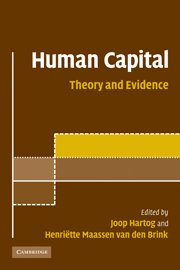Book contents
Prologue
Published online by Cambridge University Press: 22 September 2009
Summary
Human capital theory was born some four decades ago, under the strong and inspiring leadership of Theodore Schultz, Gary Becker and Jacob Mincer. It has been flourishing ever since, with many new theoretical and empirical developments. Human capital is now a familiar concept, used daily in public debates, and a favourite phrase of many politicians who want to stress the relevance of developing and disseminating new knowledge for maintaining high levels of welfare.
Research on human capital, both theoretical and empirical, is often very technical and therefore not easily accessible to those who want to use the insights in applied work, in developing government policies, human resource policies in organizations and in contributions to social debates. The same holds for students with different types of education. In many curricula, students should attain an understanding of concepts, issues and approaches without digging into all the technical details.
This book aims to be an interface between the technical research in the workshop and applications in government, education and business organizations. The book is written by staff of SCHOLAR (an acronym for Schooling, Labour Market and Economic Development), a research institute at the University of Amsterdam focusing on the economic relation between education and the labour market. SCHOLAR was founded in 1997 with a grant from the Dutch science foundation NWO. Its mission was to undertake original academic research on important issues in this area, and to disseminate the results to a wider audience than just academic specialists.
- Type
- Chapter
- Information
- Human CapitalAdvances in Theory and Evidence, pp. 1 - 4Publisher: Cambridge University PressPrint publication year: 2007



